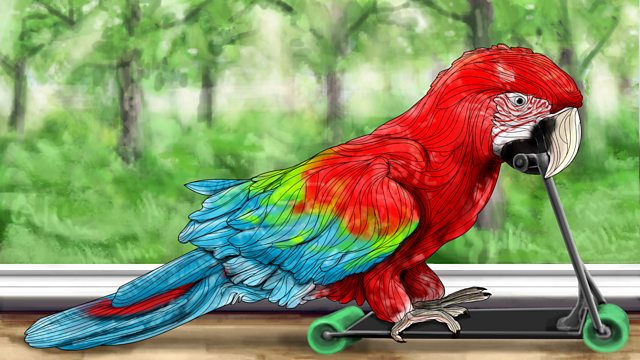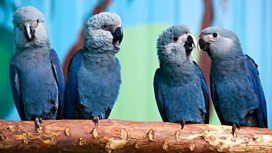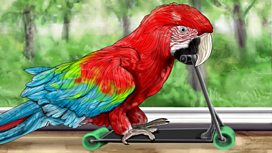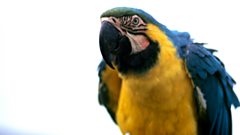Parrots
Brett Westwood explores parrots and their effect on art, literature, society, friends to the wealthy and mischievous mates of pirates. Few birds have been so close to us. From 2015
Colourful birds of the rainforest and companions of pirates, parrots evoke contradictory images. They encompass a huge range of forms from the flightless lumbering kakapo of New Zealand to the diminutive and talkative budgerigar of Australia, the chatty African grey parrot to the garishly colourful macaws of South America.
Their striking appearance and apparent sense of mischief have made parrots popular as pets from ancient Egypt to the present day. During the 19th century their exoticism made them status symbols of wealth and luxury. Noted by a young Edward Lear who, believing the upper classes fascination with the family might be lucrative, set about the task of illustrating as many species of parrot as he could for their admirers to collect. Picture the teenage Lear crouching inside the parrot enclosure at London Zoo drawing the birds – even rivalling the celebrated Audubon for best bird illustrator of the time.
The uncanny ability of some species of parrot to mimic the human voice only adds to their appeal. The Popes had a keeper of parrots and Henry VIII was supposedly captivated by his. We cast parrots as the clowns of the natural world; painted in many colours they appear mischievous but innocent, playful but intelligent. But has our anthropomorphism of parrots limited our true understanding of the family? In the words of Mark Cocker "parrots are held in cages, but they are trapped in our imaginations".
Original producer : Andrew Dawes
Reversion producer : Andrew Dawes
First broadcast in a longer form 22nd September 2015
Last on
![]()
Eleven things you should know about parrots.
![]()
The World According to Parrot
Natural Histories Comedy - Never trust a South American parrot with jealousy issues...
![]()
Tweet of the Day: Hyacinth Macaw
Sir David Attenborough meets the hyacinth macaw of the Brazilian Pantanal.
![]()
Tweet of the Day: Kakapo
Michael Palin introduces the New Zealand kakapo.
Clips
-
![]()
The World According to Parrot
Duration: 01:47
-
![]()
The ‘devastating’ illegal trade in parrots
Duration: 05:07
-
![]()
Lucy the parrot 'ripped a hole in my cheek'
Duration: 00:51
Paul Cooper

He has contributed an essay on Edward Lear’s “Illustrations of the Family of Parrots” to the forthcoming book “Rare Treasures from the Library of the Natural History Museum” and he is the author of the forthcoming book “The Bauer Brothers” on the Austrian born botanical artists Franz and Ferdinand Bauer.
Jonathan Elphick

His many books include , an award-winning �鶹������ҳ��� field guide to the birds of Britain and Ireland,��, Great Birds of Europe, the bestselling multimedia title and a major new encyclopaedic book for the NHM, . Jonathan was researcher on two vital celebrations of the cultural importance of birds by Mark Cocker, Birds Britannica and Birds and People.
He is also on the Steering Group of , a broad alliance of individuals who in their personal and professional lives draw creative inspiration from the birds, wildlife and landscapes of this country.
Vicky Hammond and Max the parrot

In the film, Bond receives a call from the Prime Minister, Margaret Thatcher, and Max the parrot asks her to 'give us a kiss, give us a kiss'.
Tony Juniper

He is a Senior Associate with the University of Cambridge (CPSL), working as a member of the teaching faculty and contributing to several programmes. In November 2012, he was named as the first .
Twitter:
Professor Ralph Pite
He is currently writing a book about the poets, Robert Frost and Edward Thomas. They were close friends in the three years before Thomas’s death in 1917, at the Battle of Arras. Both men shared a love of nature and an interest in ‘the simple life’ – in ways of living, which we would call sustainable.
Broadcasts
- Tue 22 Sep 2015 11:00�鶹������ҳ��� Radio 4
- Mon 28 Sep 2015 21:00�鶹������ҳ��� Radio 4
- Sun 3 Oct 2021 06:35�鶹������ҳ��� Radio 4








